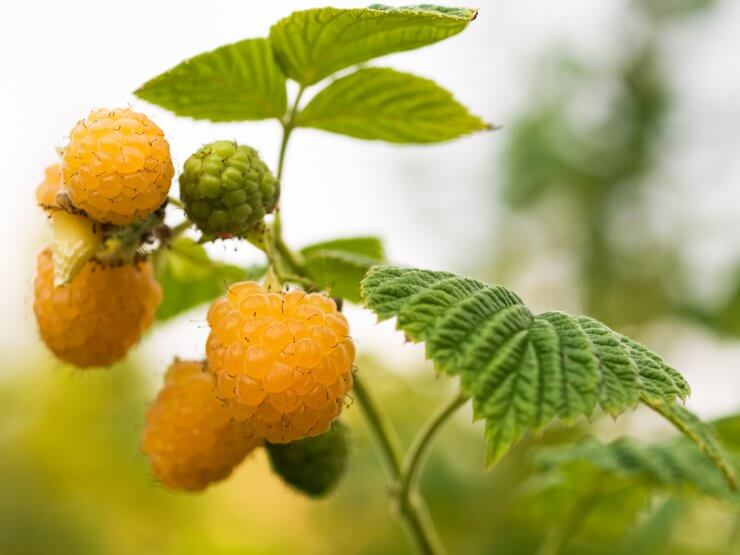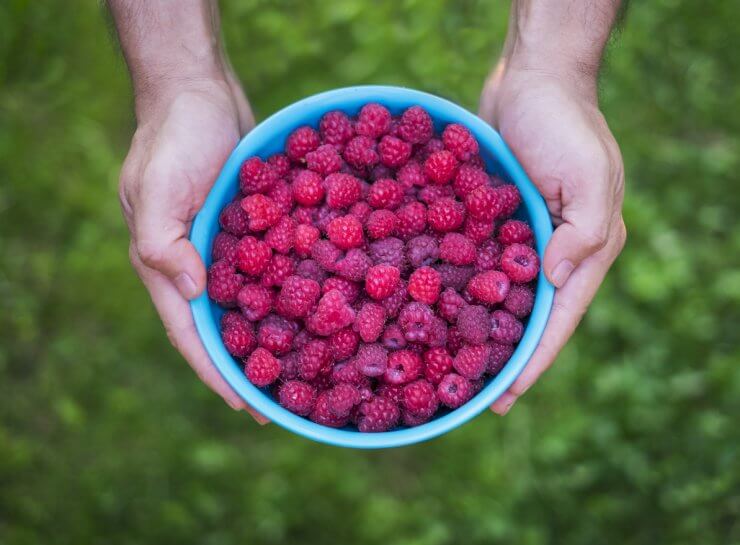
Golden raspberries
Before choosing your raspberry plants, take a moment to consider how you will use your raspberries and the colors, flavors, and sizes you prefer. In addition to summer-bearing and ever-bearing types, the main categories of raspberries are:
- Black raspberries, also known as blackcaps, including Allen and Bristol varieties
- Purple raspberries, including Clyde and Sodus varieties
- Red raspberries, including Latham and Heritage varieties
- Golden raspberries, including Amber and Fall Gold varieties
Purple raspberries are a hybrid of red and black raspberries, but they are generally treated as a black raspberry for cultivation. These raspberry varieties are often more productive than reds, and provide larger fruit with less juice, which is why they’re preferred for making jams. Black and purple raspberry plants tolerate heat well, but dislike colder climates.
Red raspberries are the most popular raspberry plants, with the most varieties. They’re the quintessential dessert raspberry, but can also be eaten—like the others—alone, with cereal or yogurt, or by the handful. Yellow-colored “golden” raspberries are considered “red,” botanically. In fact, don’t be surprised to find a few yellow raspberries popping up in your red raspberry patch due to mutation. Consider them a bonus crop and enjoy. Golden raspberries have a flavor that some say tastes like a mixture of raspberry, apricot, and bananas.

Raspberries ready to eat
Raspberry Harvesting Bonus Tips: Once raspberry plants start to fruit, plan to harvest them every day. Collect the berries in small containers to help prevent bruising. Raspberries are best eaten soon after picking, but they will stay fresh in the fridge for three to four days. If you have more berries than you can eat, rinse them gently, pat dry, and place them on a baking sheet lined with parchment paper. Pop them in the freezer and as soon as they have frozen, pour them into zipper-style freezer bags, removing as much air as possible. Use as needed. Another delicious way to preserve your raspberry harvest is to make jam or sauce.
Do you grow different varieties of raspberries? Which ones do you grow? Please tell us how you use your raspberry harvest—and what you do with all the excess raspberries. Do you make sauce or jam? Freeze them to enjoy a burst of summer flavor in the winter? Or do you give them away to family, friends, and neighbors to enjoy?


 Previous
Previous


I have a very large patch of Jewel black raspberries that is very, very productive of nice big berries. I freeze them, jam and jelly them, eat them and give several away to family and friends. I provide plants for those that want to grow their own. I also have a small red raspberry patch that I am working on making a bit larger and more productive. Adjusting the soil and replanting. I also have a patch of White blackberries I’m not sure I will keep. I have gogi berries, gooseberries and blueberries, also.
Pamela,
Wow. I’m impressed and a little jealous. Your berry patch sounds amazing and you have some very lucky friends and family that get to share your harvest. I’m curious why you are considering getting rid of the white blackberries…are they less productive, more prone to pests and diseases or perhaps the flavor is not as good as the other berries?
Let us know how your red raspberry patch performs – what remediation are you planning for your soil to improve productivity?